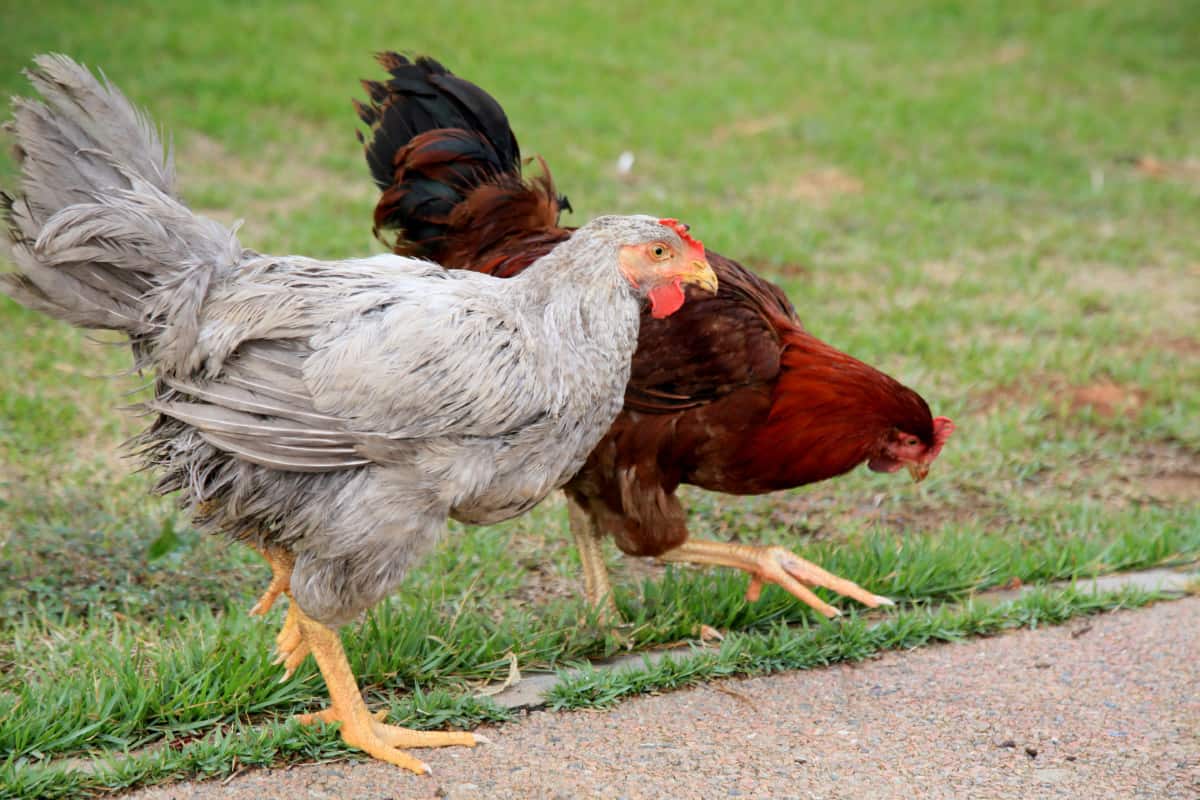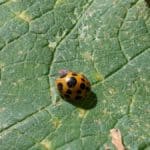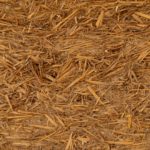The first time I heard one of my chickens sneeze I admit that I freaked out a little.
After some research, I found that while it may seem very strange to us, it’s not uncommon for a chicken to sneeze. However, there could be an underlying health issue, and it is a good idea to look out for the signs. So, why is my chicken sneezing?
Chickens can sneeze due to dust and dander, as it helps them to clear their airways. In more severe cases, if your chicken is coughing, sneezing, wheezing, and having trouble breathing, then the chicken could be suffering from respiratory disease (CRD) and requires immediate medical attention.
If exposed to mycoplasma gallisepticum, a healthy chicken can fight off bacteria. However, if a chicken has a weak immune system, the disease can kill them. It is crucial to determine what is causing your chicken to sneeze to be treated accordingly.
This article will discuss the causes of sneezing in chickens and what you can do about them.
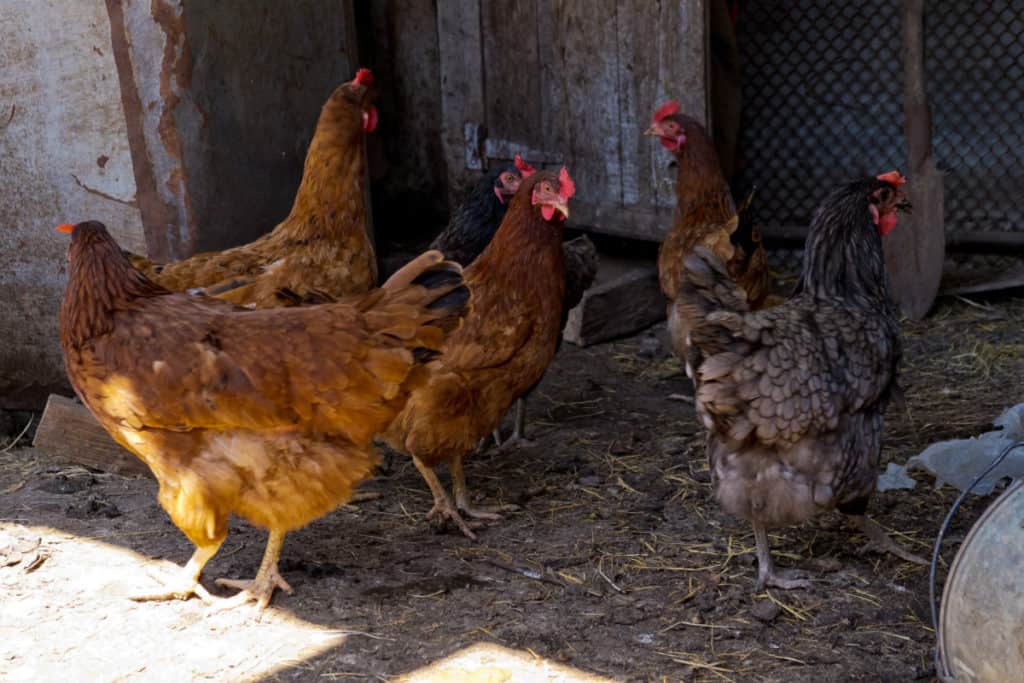
What Causes A Chicken To sneeze?
There are many things that can cause chickens to sneeze, such as:
Nasal Irritation
A chicken’s airways are very sensitive, so they will often sneeze to clear the dust if exposed to a dusty environment. If your chicken inhales dust and dander, their mucus secretions, scavenging cells, and cilia (their tract’s three defense mechanisms) react and make them sneeze to clear it out.
A chicken’s nostrils are located right above its beak. Therefore, as they eat, any dust from their meal can enter their airways, causing them to sneeze. This often happens at my house right after I refill the feeder. Make sure your chickens have access to fresh drinking water, as they dip their beaks to drink it can help clear off the dust.
Treatment And Prevention
- Before feeding your chickens, run it through a mesh so that it can separate the dust from their food.
- Make sure there is proper ventilation in your chicken coop.
- Clean the floor of the pen and change their bedding once a week.
Mycoplasma (CRD – Chicken Respiratory Disease)
In chickens, this is an upper respiratory disease; the most common strain is mycoplasma gallisepticum (MG). Complications such as respiratory infections or stress can activate this disease that adult chickens carry.
Chickens that hatch from eggs laid by an infected hen automatically have the disease because it gets transferred to the yolk of the egg.
Symptoms
- Difficulty breathing
- Watery eyes
- Coughing
- Sneezing
- Runny nose
- Hens stop laying eggs
- Infrequent eating and drinking
Treatment And Prevention
- Isolate and quarantine the infected chickens and have your entire flock tested.
- Disinfect your chicken’s coop.
- Before pullets start laying eggs, have them vaccinated.
- Give them antibiotics.
Infectious Coryza
This respiratory disease spreads through contaminated water and the air. If healthy chickens come in contact with the infected birds, they too will contract the disease. Infectious coryza will remain dormant until it is triggered by stress.
Symptoms
- Smelly nasal discharge
- Sneezing
- Swelling of the entire face
- Shutting their eyes
- Egg production stops
- Infrequent eating and drinking
- Growth slows down
Treatment And Prevention
Sadly, there isn’t a cure for this disease, and infected chickens have to be euthanized. You can, however, prevent this disease by:
- Vaccinating chicks within the first week of life.
- Not adding more chickens to the flock until the illness has been taken care of.
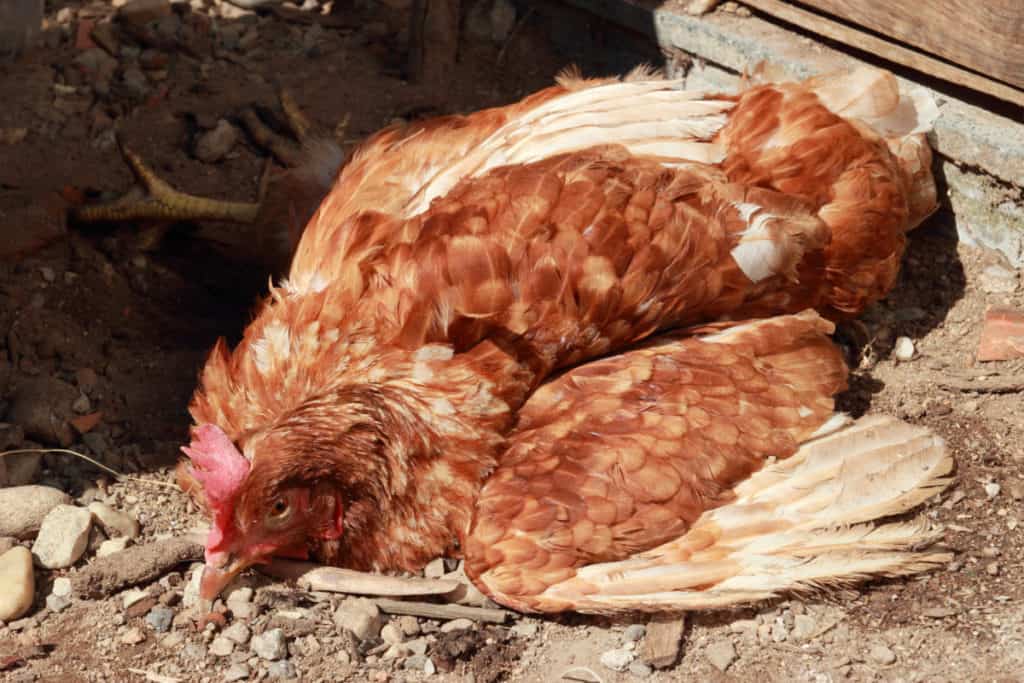
Newcastle Disease
Contaminated water and food and infected poop are the cause of Newcastle disease spreading amongst your flock. Infected hens also transfer the disease to their chicks, and in severe cases, it can wipe out the entire flock within 72 hours of infection, without any signs or symptoms before the time.
Symptoms (if they remain alive after 72 hours)
- Uncoordinated movements
- Head shaking and tilting
- Paralysis (the virus attacks the brain)
- Sneezing
Treatment And Prevention
- Contact an avian veterinarian if you see any symptoms and isolate the symptomatic birds.
- Increase their vitamin intake helps to reduce symptoms.
Infectious Laryngotracheitis
This is the chicken version of herpes, which causes bloody cough discharge and a red swollen face (conjunctivitis).
Symptoms
- It starts with sneezing
- Difficulty breathing
- Head shaking as chickens try to clear the airways
- Swollen face
- Coughing blood (unfortunately, if it reaches this stage, it is too late for treatment, and you need to euthanize your infected chicken(s) to prevent the disease from spreading)
Treatment And Prevention
- Early detection and vaccination.
- Remove dead chickens and discard their carcasses properly to prevent contamination.
Gapeworm (Parasite)
A gapeworm is a parasitic creepy-crawly that lives in a chicken’s windpipe. As the tapeworm grows, it causes suffocation and significant discomfort in the chicken’s airways.
Symptoms
- Head shaking
- Coughing
- Sneezing
- Mouth breathing
Treatment And Prevention
- Supply oxygen to your chickens during treatment.
- Deworm your whole flock regularly.
- Don’t build a chicken coop on the soil where they can ingest eggs. A concrete pen will prevent infestation.
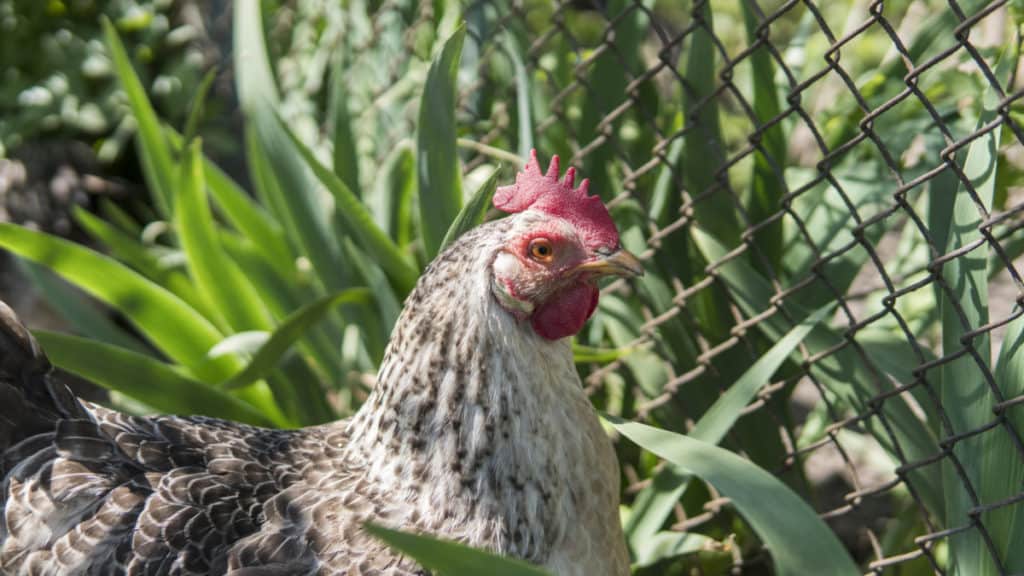
Infectious Bronchitis Virus
This is a coronavirus that only affects chickens, not humans. Hens (egg layers) and their chicks are the ones affected by this virus. Chicks sneeze and cough for about two weeks after hatching until their immune system gets stronger and they get better.
Symptoms
- Sneezing
- Coughing
- Soft misshapen eggs
Treatment And Prevention
- Test your chickens with an RT-PCR test to get a diagnosis.
- No known cure is available, but the symptoms are treatable; consult a veterinarian.
- Vaccinate adults and chicks to prevent infection.
- Isolate infected chickens.
Colibacillosis
This disease starts with chickens drinking and eating contaminated water or food, infecting them with E. coli. E. coli is contagious, and it will spread to the other chickens if not caught early. Young chicks and chickens with weak immune systems are the ones that are most affected by this disease.
Symptoms
- Effects chickens’ movement, digestion, and egg-laying (system-wide infection)
- Coughing
- Sneezing
- Infection of the air sacs (can be fatal)
Treatment And Prevention
- Regular checkups early detection is easier to treat.
- Proper coop ventilation and sanitation.
- Isolate infected chickens.
- Treat with broad-spectrum antibiotics.
- Keep feeding dishes clean.
Bird Flu / Avian influenza
This fast-spreading disease in chickens affects people as well. In mild pathogenic cases, chickens are lazy and don’t want to do anything. On the other hand, high pathogenic cases have much more severe effects on your chickens and are fatal. Chicken meat can become contaminated with bird flu and causes global panic after one single outbreak.
Symptoms
- Sneezing
- Coughing
- Swollen wattles and combs
- Infected chickens stop eating
- Sick hens stop laying eggs
- White and red spots appear on the head and legs
- Nose bleeds
Treatment And Prevention
- Remove dead chickens and discard their carcasses properly.
- There is no cure for bird flu, but mild cases can be treated. Severe cases are fatal to chickens.
- If your chickens do have bird flu, notify the CDC immediately.
In Conclusion
A sneezing chicken isn’t a major cause of concern. However, you must take preventative measures to ensure that your flock has little to no chance of getting infected by these viral and bacterial infections and diseases.
Early detection can save your sick chickens, so have an avian veterinarian do regular checkups and inspections. Chickens provide us with lots of joy (and eggs), so we need to look after and care for them to live a happy and healthy life.

